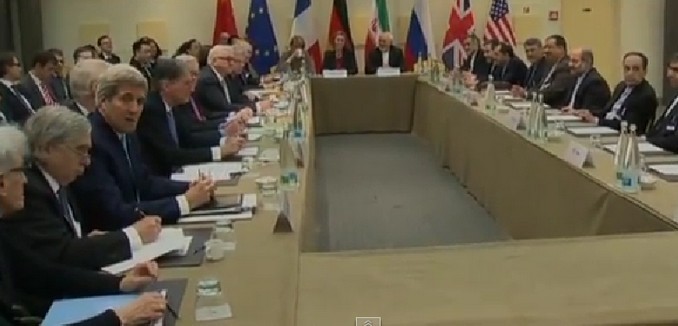The P5+1 global powers and Iran will issue a “general” statement to close the latest round of nuclear talks in Lausanne, Switzerland, according to an Associated Press (AP) report today. According to the AP, the statement would “[allow] the sides to claim enough progress has been made thus far to merit a new round.” Russian Foreign Minister Sergei Lavrov returned to Lausanne on Tuesday to join the other foreign ministers in making the announcement. Administration officials characterized the development as the beginning of a new phase in the talks, a description that was met with some skepticism on social media from those who questioned if any substantive progress had been made at all.
The major sticking points between the two sides have been and reportedly remain the lifting of United Nations sanctions, limitations on research and development on advanced centrifuges, the duration of the deal, and whether or not Iran would be willing to ship its uranium from the country. On Sunday, the AP reported on continued Iranian demands regarding advanced centrifuges; that same day, The New York Times reported that Iran was backtracking on the possibility of shipping its enriched uranium to Russia, although previous reports indicated that they would.
Today’s statement will be read against the backdrop of a series of concessions made by the West since the opening of the current round of talks. A Wall Street Journal article from last Wednesday detailed that the Western powers were willing to allow Iran to postpone fully disclosing all aspects of its nuclear program until after sanctions relief would have been implemented. The concession, if confirmed, would be taken as badly undermining any envisioned verification regime: without information about the full extent of the progress of Iran’s nuclear program, it’s impossible to verify that all elements of the program have been halted or reversed.
This past Thursday, the Associated Press reported that the United States was willing to allow Iran to continue to spin centrifuges at its underground military enrichment bunker at Fordow. The Iranians would be obligated to run the centrifuges only on nonnuclear elements, but analysts – following the previous lead of American officials – immediately emphasized that the machines could at any time be repurposed to enrich uranium, especially at a site that is essentially impervious to military attack. The United States and Europe have historically demanded that the Fordow site be dismantled as a condition for sanctions relief.
In 2012 and 2013, Western powers had demanded that Iran ship out some if its uranium stockpiles. On Sunday, Iran backtracked from a long-held negotiating stance under which it would ship its enriched uranium to Russia. The Iranians had used the possibility to secure concessions on the number of centrifuges they would be allowed to operate. State Department acting spokesperson Marie Harf told reporters on Monday, “There’s a number of different ways we can [get to a one-year breakout]. You don’t have to ship it out of the country to get to a year breakout time.”
[Photo: euronews (magyarul) / YouTube ]




